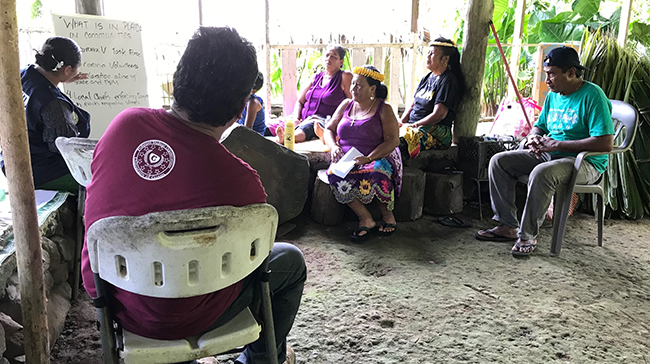
In the Federated States of Micronesia, community-based planning – or microplanning – of public health interventions has been ongoing since 2017. This approach is now being used in preparing for and responding to COVID-19.
Microplanning emphasizes grounds-up solutions and recognizes the key role of traditional leaders in promoting health and wellbeing. In the context of the global coronavirus pandemic, it started with chiefs from the Uh municipality on Pohnpei main island. They came together to plan and implement a comprehensive COVID-19 Community Outreach Package; working with other key stakeholders such as the World Health Organization, UNICEF, Micronesian Red Cross, and local non-governmental organizations. This package aimed to empower local communities to protect themselves from COVID-19.
During the first phase, the team held a series of microplanning workshops with traditional leaders, or chiefs. The involvement of chiefs from the beginning of the planning process provided a sense of ownership in the planning of these workshops and also helped encourage, strengthen and sustain meaningful community engagement. The chiefs worked together to identify risks specific to their communities, such as social gatherings and cultural practices, and discussed ways to mitigate these risks. The chiefs were then supported to develop action plans with solutions tailored to their local context. These workshops also provide an opportunity for the traditional leaders to ask questions and address any misinformation about COVID-19 circulating in their communities. The strong partnership fostered between the outreach teams and the village leaders was critical in building the rapport, trust and respect necessary for meaningful and sustained community engagement. The action plans developed for Uh municipality involved many communities organizing COVID-19 volunteer groups and issuing recommendations on culturally-sensitive practices, such as health protection during funerals and traditional feasts. Community initiatives were incorporated in government strategies to facilitate coordination and prevent duplication of efforts.
During the second phase, involving house-to-house outreach, trained teams provided education on COVID-19, handwashing and social distancing while also distributing soap and educational materials. This outreach was supported by multi-sector collaboration between the Departments of Health and Education as well as local and international partners including technical support from the World Health Organization. The Pohnpei State completed the microplanning workshops with all main island municipalities, and community action plans were being finalized. The activity was so positively received by communities that local business owners requested support for their own microplanning activity to help prepare their businesses and protect customers from COVID-19.
